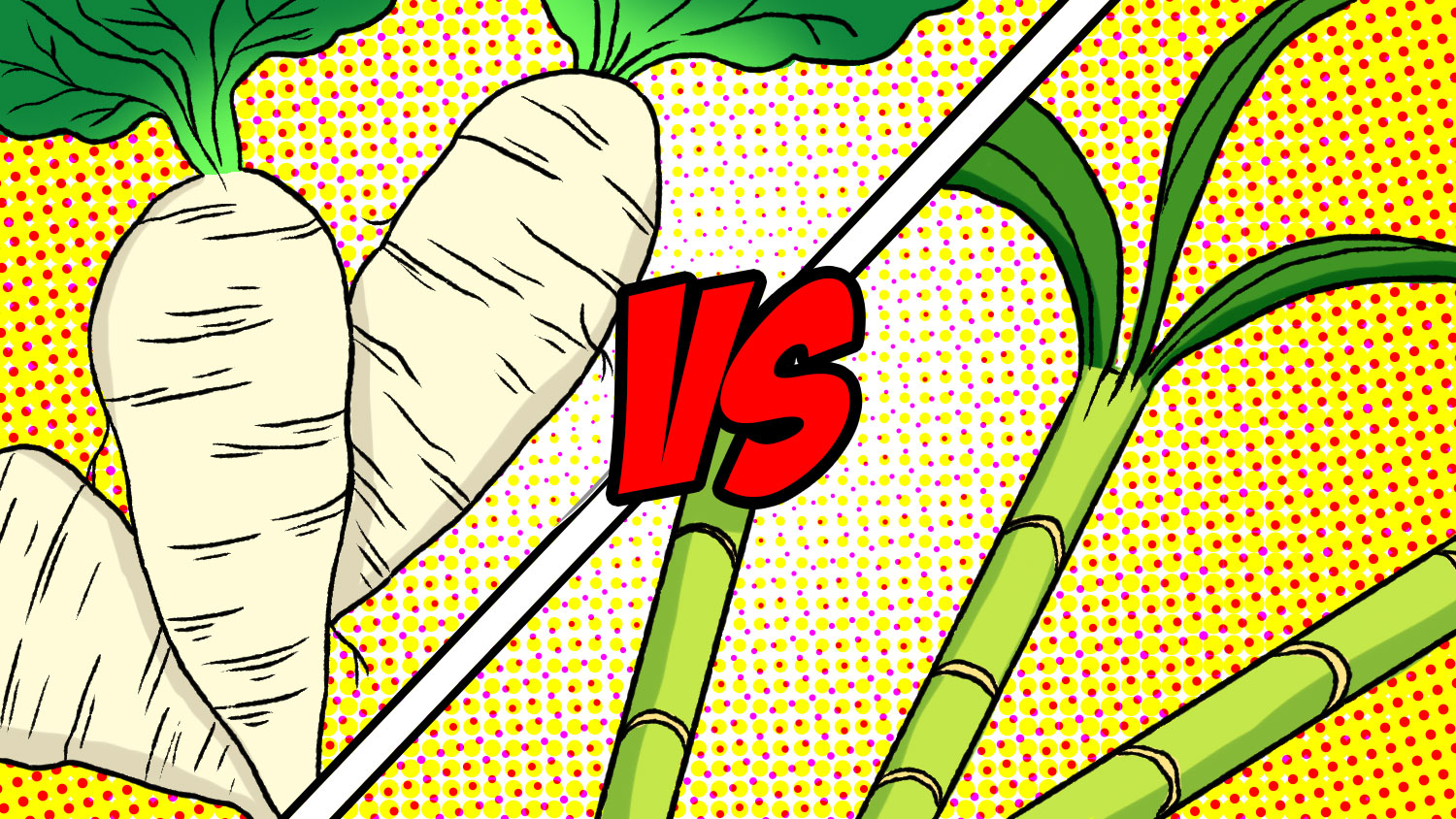Which innovations are shaping the future of Sugar beet vs sugar cane production?
The Great Argument: Sugar Beet Vs Sugar Cane - Which Is the Superior Option for Sugar?
The debate over sugar beet versus sugar cane as the recommended sugar involves a number of critical factors. Each deals distinct advantages and challenges regarding manufacturing, taste, and wellness effects. While sugar beet might interest those focusing on sustainability, sugar cane has its very own cultural and culinary relevance. As customers become more conscious of their choices, the question continues to be: which sweetener absolutely stands out in today's market?
The Beginnings of Sugar Beet and Sugar Cane
Although sugar cane has actually been cultivated for hundreds of years, mostly in exotic areas, sugar beet arised as a significant alternative in cooler climates during the 18th century. Sugar cane, belonging to Southeast Asia, was initial tamed around 8000 BCE and spread globally through profession and expedition. Its high sucrose content made it an important crop, bring about substantial haciendas in areas like the Caribbean and Brazil.
On the other hand, sugar beet was first grown in the Mediterranean around the 18th century, specifically obtaining grip in Europe as an action to sugar cane shortages. The plant flourishes in temperate environments, making it suitable for areas with chillier weather condition. The exploration that sugar might be drawn out from beet origins transformed sugar manufacturing, particularly during the Napoleonic Battles when trade constraints restricted cane sugar gain access to. The surge of sugar beet farming noted a pivotal minute in the background of sweeteners, providing a local source for lots of countries.
Manufacturing Procedures: From Area to Sweetener
The production processes of sugar beet and sugar cane disclose considerable differences in growing methods, gathering methods, and refinement stages. Recognizing these nuances is important for valuing how each crop adds to the overall sugar market. This comparison highlights the one-of-a-kind qualities and difficulties connected with both sources of sweet taste.

Farming Strategies Contrast
Farming techniques for sugar beet and sugar cane reveal distinctive approaches that influence their production processes, from field prep work to final sweetener removal. Sugar beet cultivation generally entails plowing and traumatic to produce a fine seedbed, complied with by seeding in rows to facilitate development. This plant gain from cooler environments and is usually grown in springtime. On the other hand, sugar cane is usually planted in furrows with pre-sprouted cane items, needing a warm, tropical climate for ideal growth. Cane areas are typically laid out to take care of water effectively, given its demand for substantial watering. Both plants are handled with specific fertilizing and bug control methods tailored to their development atmospheres, affecting yield top quality and efficiency in sweetener extraction.

Gathering Approaches Described
Effective gathering techniques for sugar beet and sugar cane play a vital function in assuring optimal return and quality of the last item. Sugar beet gathering normally utilizes mechanized origin harvesters, which successfully root out the beetroots from the soil and separate them from the foliage. This method minimizes damage to the beets and reduces labor expenses. In contrast, sugar cane harvesting may make use of either manual labor or machinery, relying on the area and range of production. Mechanical farmers cut the cane at the base and usually strip away the leaves, optimizing the procedure for bigger fields. Both methods require cautious timing to ensure the plants are gathered at peak sweetness, affecting the high quality of the last sugar item.
Refinement Process Differences
While both sugar beet and sugar cane undertake strenuous improvement procedures to change their raw kinds into functional sweeteners, the methods employed vary substantially. Sugar beet refinement begins with cleaning and cutting the beetroots right into slim cossettes, adhered to by diffusion, where warm water extracts sucrose. The resulting juice is after that cleansed, focused, and crystallized. On the other hand, sugar cane handling entails crushing the stalks to draw out juice, which is then clarified making use of lime and warm to remove contaminations. The cane juice is evaporated to form syrup before formation. Ultimately, while both procedures intend to create white sugar, the distinct techniques highlight the one-of-a-kind attributes of each resource and their ramifications for taste and purity in the final product.
Nutritional Profiles: What's in Your Sweetener?
The dietary accounts of sugar beet and sugar cane present distinct distinctions worth checking out. This contrast includes aspects such as calorie web content, mineral and vitamin presence, and variants in glycemic index. Recognizing these elements can supply understandings right into exactly how each sweetener may influence general health and wellness.
Caloric Web Content Comparison
Recognizing the caloric content of sugar beet and sugar cane is essential for those conscious of their nutritional options. Both sugar largely are composed of sucrose, adding a comparable caloric worth. Generally, sugar beet consists of around 387 calories per 100 grams, while sugar cane has about 390 calories per the exact same quantity. The mild distinction in caloric material might not considerably impact most diet plans; nonetheless, it is remarkable for those carefully checking their calorie consumption. Additionally, both sugar sources offer power but lack vital nutrients, making them mostly resources of empty calories. As a result, people seeking healthier options might wish to consider these aspects when picking in between sugar beet and sugar cane as their favored sweetener.

Mineral and Vitamin Content
Caloric web content gives only a part of the image when reviewing sugar beet and sugar cane. Both resources of sugar vary substantially in their mineral and vitamin profiles. Sugar beets are extremely abundant in necessary nutrients, consisting of potassium, magnesium, and iron. They additionally contain small quantities of vitamins such as B6 and folate, contributing to their nutritional worth. On the other hand, sugar cane offers a different collection of advantages, consisting of calcium, phosphorus, and traces of B vitamins. While neither choice is a considerable source of minerals and vitamins contrasted to whole foods, sugar beetroots might have a slight edge as a result of their higher mineral content. Ultimately, customers seeking nutritional benefits from sugar need to think about these differences in profiles.
Glycemic Index Differences
Glycemic index plays a vital role in assessing just how various sugar influence blood glucose degrees. Sugar beet and sugar cane exhibit noteworthy differences in their glycemic responses. Normally, sugar beet has a lower glycemic index contrasted to sugar cane, leading to a slower and steadier surge in blood glucose levels after intake. This characteristic may make sugar beet a more suitable option for people taking care of diabetic issues or those seeking to maintain steady power degrees. In contrast, sugar cane tends to cause an extra fast spike in blood sugar, which might cause quicker energy crashes. Understanding these distinctions is considerable for customers intending to make enlightened dietary options pertaining to sweeteners and their influence on general wellness.
Ecological Impact: Sustainability Considerations
While both sugar beet and sugar cane are vital resources of sugar, their ecological effects and sustainability factors to consider vary substantially. Sugar beets, primarily grown in warm areas, usually require less water and can be cultivated in varied climates. They also take advantage of crop rotation techniques, which improve soil wellness look at here now and minimize the demand for synthetic plant foods. Nevertheless, extensive farming of sugar beets can lead to dirt depletion and chemical usage.
In contrast, sugar cane prospers in exotic environments and frequently demands substantial water resources for irrigation (Sugar beet vs sugar cane). The monoculture nature of sugar cane farming can aggravate dirt disintegration and biodiversity loss. Additionally, the burning of cane fields before harvest launches carbon emissions and contributes to air pollution. Both plants face difficulties pertaining to climate modification, however their varying growing methods profoundly influence their general sustainability profiles. Consequently, the choice between sugar beet and sugar cane entails considering these ecological influences meticulously
Taste and Culinary Uses: Which Sweetener Reigns Supreme?
The selection between sugar beet and sugar cane expands beyond environmental factors to consider to incorporate taste and cooking applications. Sugar beet, frequently perceived as having a somewhat various taste profile, often tends to be much less sweet than more helpful hints sugar cane. This refined distinction can affect its usage in dishes, especially in baked products where a neutral sweetness is wanted.
Conversely, sugar cane is commemorated for its unique, rich, and much more intricate taste, making it a recommended option for beverages and desserts - Sugar beet vs sugar cane. Its all-natural molasses material can improve the deepness of flavors in various recipes
In food preparation, sugar cane's versatility shines with in marinades, lusters, and confections, while sugar beet is generally located in processed foods and sugar like granulated sugar. Inevitably, the choice between the 2 sweeteners often pivots on individual preference preferences and specific cooking applications, with each offering distinct advantages in the kitchen area.
Health Effects: Sugar Beet Vs Sugar Cane
Both sugar beet and sugar cane have unique wellness implications that can influence customer selections. Sugar beet vs sugar cane. Sugar beet is frequently related to for its higher fiber web content, which can aid gastrointestinal health and wellness. Furthermore, it consists of specific anti-oxidants that may contribute to total health. On the various other hand, sugar cane is rich in nutrients such as calcium, potassium, and magnesium, offering some mineral advantages
Nonetheless, both resources largely are composed of sucrose, which can result in similar health and wellness problems when eaten excessively, such as excessive weight, diabetic issues, and cardiovascular disease. The handling techniques likewise vary; sugar beet is generally fine-tuned more intensively, possibly causing a loss of specific nutrients. Consumers concerned about ingredients might like sugar cane, as it often undertakes less handling. Eventually, comprehending these wellness effects can lead individuals toward making notified choices regarding their sweetener options.
Consumer Preferences: Patterns and Insights
Consumer choices for sugar have actually advanced significantly recently, affected by health trends, ecological problems, and nutritional choices. Boosted awareness of the adverse health effects related to too much sugar usage has actually led many consumers to look for choices. This change has motivated a growing passion in all-natural sweeteners, with sugar beet and find out this here sugar cane being at the leading edge of conversations.
Research suggests that consumers are significantly preferring sugar beet as a result of its perceived environmental advantages, as it is commonly grown closer to refining plants, lowering transportation exhausts. Alternatively, sugar cane is frequently associated with exotic areas and may bring perceptions of sustainability obstacles.

Often Asked Concerns
Exactly How Do Sugar Beet and Sugar Cane Affect Blood Glucose Levels?
Sugar beet and sugar cane both include sucrose, which can raise blood glucose levels. The effect greatly relies on individual metabolic process and usage quantities, but both sources contribute in a similar way to blood glucose feedbacks in the majority of instances.
Which Sugar Is Much Better for Baking and Food preparation?
When examining sweeteners for baking and cooking, one have to take into consideration appearance, flavor, and moisture retention. Sugar beet and sugar cane both use one-of-a-kind high qualities, with sugar cane frequently preferred for its richer flavor account in culinary applications.
Can Sugar Beet or Cane Be Used in Vegan Diets?
Both sugar beet and sugar cane can be utilized in vegan diet regimens. They are plant-derived sweeteners, making them appropriate for individuals seeking vegan-friendly alternatives without animal items, guaranteeing ethical choices in their culinary practices.
What Are the Historic Usages of Sugar Beet and Cane?
Historically, sugar beet and cane served as necessary sources of sweetness, with cane cultivated in exotic regions and beet in pleasant areas. Both have been indispensable to numerous societies, economies, and cooking traditions throughout background.
Exist Any Type Of Alternatives to Sugar Beet and Cane?
Alternatives to sugar beet and cane consist of agave nectar, honey, maple syrup, and sweetening agents like aspartame and sucralose. These replacements provide differing tastes and health advantages, appealing to varied nutritional preferences and restrictions.